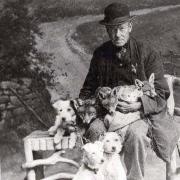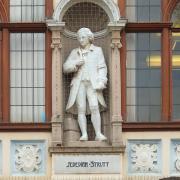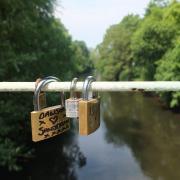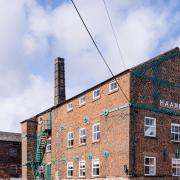David Marley meets Mark Hallas, chief executive of the national Crimestoppers Trust charity, whose inspirational life journey has taken him from a Derby classroom to some of the most challenging missions in the British Army

‘It was a moment of quiet reflection as I took my place as the 109th person in a queue of 110 people waiting to be presented to HRH The Princess Royal to be appointed an Officer of the Order of the British Empire (OBE),’ recalls Mark Hallas, chief executive of the national crime-fighting charity, Crimestoppers.
It was the autumn of 2009 and Mark, aged just 44 at the time, was attending his investiture at Buckingham Palace – having recently been promoted to the rank of brigadier in the British Army and with it a new mission as military head of intelligence and security with an international coalition in Afghanistan.
‘The audience with Princess Anne may have only lasted for a few minutes, but I was so impressed with her interest in the military and it really was a great moment for my family,’ Mark remembers. ‘It was impossible not to think about the incredible journey my life had taken.
‘My parents lived in the Normanton area of Derby,’ explains Mark. ‘My mother enjoyed her job in the aircraft molding department at Rolls-Royce and my father worked in local foundries. I loved growing up in the city and remember with great fondness my first weekend job as a butcher’s assistant – an eye-opening experience which gave me a great insight into the world of work from an early age.’

Mark attended St Joseph’s Primary School before going on to St Thomas More RC School at Allenton, where he enjoyed discovering the natural environment. ‘I loved visiting the Peak District – and I took every opportunity to take part in caving and climbing adventures.’
From an early age Mark developed a desire to travel and discover the world – and also realised the importance of education in helping him to achieve his dreams. ‘I saw an advert about the army’s technical college in a local newspaper, so I decided to apply to join the Defence Sixth Form Academy at Welbeck College.
‘The deal was simple at the college – you agreed to do science-based A-levels and as long as you passed and kept your nose clean, there was a direct passage to take a commission as an officer at Sandhurst,’ he says.
Mark embraced military life and was commissioned into the Intelligence Corps in 1984. He read Applied Science at the Shrivenham campus of Cranfield University and spent his early years as an intelligence officer.

For the next 15 years he held appointments in the UK, Germany and Sierra Leone, including operational, leadership and headquarters management posts – all focusing on intelligence, security and counter-terrorism operations.
‘Operational tours can often be the highlight of a military career, but they can also be a flat-out experience, working 16 hours a day, seven days a week – and during this time you are often required to make life and death decisions,’ Mark explains.
Education remained an important part of Mark’s development as a leader in the British Army and during his service he secured an MSc in Defence Technology and an MA in International Relations.
‘I also spent some time on secondment in the Blue Ridge Mountains of Virginia, which was an amazing experience – especially as I was the only British person on assignment with hundreds of Americans.’
In 2005 he became the chief of staff to the Chief of Defence Intelligence – successfully implementing a complete reorganisation of 4,000 personnel. By 2008 he was promoted to the rank of brigadier. The appointment took him to Afghanistan as the military head of intelligence and security of an international coalition.
‘This was a challenging deployment – over a 12 month period I was responsible for the twin challenges of safeguarding our own forces’ lives – as well as developing a strategy for engaging anti-coalition and anti-government forces,’ he explains. ‘It was always a fine balance to gather intelligence, work out of the legalities of such information, and then using it to protect life – but it was a great privilege to serve my country during this time.’
Mark returned to the UK to become director of the Intelligence Corps as well as taking command of all of the UK’s defence intelligence training schools. During his last year with the military he became a member of the Royal College of Defence Studies where he completed a year’s study into strategic planning and international relations.
On leaving the army in 2013 he was keen to ensure his next steps were in the voluntary sector. ‘Many colleagues who were leaving the army at the same time were joining big corporations in leadership roles in security and compliance but I was conscious that having enjoyed a 30-year career in the military I wanted to continue serving the public and doing good work for society in general,’ Mark explains.
In the same year he took the helm as chief executive of the national independent crime-fighting charity, Crimestoppers. The charity provides an essential conduit for members of the public to report information safely, securely and anonymously to the police and wider law enforcement agencies.
‘There are a lot of similarities between my work in the military and the work of Crimestoppers,’ acknowledges Mark. ‘I spend a lot of my time developing partnerships with police and crime commissioners, chief constables, Home Office ministers and senior civil servants to improve on how crimes are detected and potentially solved using the Crimestoppers’ service.
‘Many people don’t appreciate that Crimestoppers is a charity and we have to secure funding to ensure we can continue our important work. This year I took part in the London Marathon to raise money for the charity – and I think I’m going to have to commit to doing it again next year – if only to improve on my time,’ laughs Mark.
Local county-based committees are the life-blood of the Crimestoppers charity and Mark is committed to ensuring this continues. ‘Local involvement of people is a core strength of our work – and it has been ever since the charity was set up by Lord Ashcroft in the 1980s. Our local volunteers, including in Derbyshire, work closely with police and crime commissioners and police staff to ensure we can create effective campaigns to help solve crimes that concern people in local areas.’
Information given to Crimestoppers is always provided on an anonymous basis – calls are never traced or recorded and individuals giving information do not have to go to court or give a statement. ‘This enables people to speak with confidence – and without fear that the information they give will come back on them,’ Mark explains.
Over 60 staff work in a dedicated Crimestoppers contact centre – which operates 365 days a year, seven days a week – handling thousands of telephone and online enquiries every month. ‘We have up to 20 agents on duty at any one time. Information that comes into the centre is usually processed within an hour or two and every year this information helps to prosecute dozens of offenders,’ he says.
‘We often see our greatest successes in cases where the police have hit a brick wall in an investigation. By creating engaging public campaigns in a local area, which sometimes includes a reward for information leading to a successful prosecution, we work with senior investigating officers from the police to fight crime. And this continues to be a very effective way of detecting offences throughout England and Wales.’
With a modest turnover just short of £5 million per year, the charity has to ensure it works in the most efficient manner possible. ‘We’re always looking for new and innovative ways to increase income for the charity. Recently, we’ve started to offer a service to private-sector partners to provide whistle-blowing solutions to enable the employees of companies to have a safe and anonymous route to provide information on wrongdoing or things that concern them – and it is proving to be very effective.’
As part of Mark’s commitment to serving the community he is also a Governor of Taunton School. In any spare moments he enjoys spending time in his adopted county of Somerset with his wife Allison, who works as a nurse in a local doctor’s surgery. ‘I spend a lot of time travelling during the week – so it is great to get back to spend time with Allison on a weekend. I also love coming home to my native Derbyshire to see my Mum, and recently one of my children and I went walking in the Peak District which brought back lots of happy memories,’ he grins.
He is also very proud of his two sons. His eldest Edward has just started a career with the Metropolitan Police as a constable, while his youngest son George, having completed a double first-class degree at Cambridge University, has gone on to work for an asset management company. ‘I’m really delighted that my sons have had the opportunity to get a good education and establish their own careers – and I hope they get as much satisfaction as I have from mine.’
As crime changes and continues to evolve – combined with the pressures on modern day policing – Mark can be confident the services he and Crimestoppers provide to the people of Derbyshire will be more important than ever before. With his calm, effective and professional outlook residents can be sure that the man who started his life in the classrooms of Derby will be helping to make local communities safer places to live and work in the future.



























